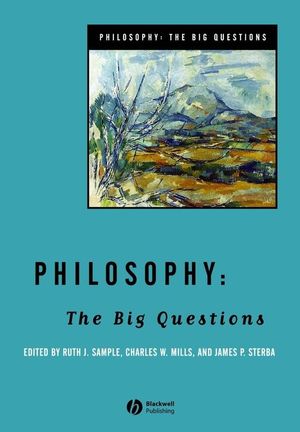Philosophy: The Big QuestionsISBN: 978-1-4051-0828-7
Hardcover
548 pages
February 2004, Wiley-Blackwell
 This is a Print-on-Demand title. It will be printed specifically to fill your order. Please allow an additional 10-15 days delivery time. The book is not returnable.
Other Available Formats: Paperback
|
||||||
Acknowledgments.
Part I: What Can We Know?.
Introduction.
1. René Descartes, From Meditations On First Philosophy.
2. David Hume, From An Enquiry Concerning Human Understanding.
3. Jonathan Vogel, “Cartesian Skepticism And Inference To The Best Explanation”.
4. Helen Longino, From Science As Social Knowledge.
5. Charles W. Mills, “Alternative Epistemologies”.
6. Genevieve Lloyd, From The Man Of Reason.
7. W. K. Clifford, “The Ethics Of Belief”.
8. Peter Van Inwagen, “It Is Wrong, Everywhere, Always, And For Anyone, To Believe Anything Upon Insufficient Evidence”.
Part II: What Can We Know About The Nature And Existence Of God?.
Introduction.
9. St. Anselm, From Proslogium.
10. Gaunilon, “Reply To Anselm”.
11. William L. Rowe, “The Ontological Argument”.
12. William L. Rowe, “The Cosmological Argument”.
13. David Hume, From Dialogues Concerning Natural Religion.
14. R. G. Swinburne, “The Argument From Design”.
15. Blaise Pascal, “The Wager”.
16. Stephen P. Stich, “The Recombinant DNA Debate: A Difficulty For Pascalian-Style Wagering”.
17. George Schlesinger, “A Central Theistic Argument”.
18. J. L. Mackie, “Evil And Omnipotence”.
19. Eleonore Stump, “The Problem Of Evil”.
20. Deborah Mathieu, “Male-Chauvinist Religion”.
21. William R. Jones, From “Is God A White Racist?”.
Part III: Are We Ever Free?.
Introduction.
22. Paul Holbach, From The System Of Nature.
23. A. J. Ayer, “Freedom And Necessity”.
24. Roderick M. Chisolm, “Human Freedom And The Self”.
25. Harry G. Frankfurt, “Freedom Of The Will And The Concept Of A Person”.
26. James P. Sterba And Janet Kourany, “How To Complete The Compatibilist Account Of Free Action”.
27. Derk Pereboom, “Living Without Free Will: The Case For Hard Incompatibilism”.
28. Richard Double, “Metaethics, Metaphilosophy, And Free Will Subjectivism”.
Part IV: Does Our Existence Have A Meaning Or Purpose?.
Introduction.
29. Leo Tolstoy, From My Confession.
30. William Lane Craig, “The Absurdity Of Life Without God”.
31. Arthur Schopenhauer, “On The Vanity Of Existence”.
32. Albert Camus, From The Myth Of Sisyphus.
33. Jean-Paul Sartre, “Existentialism Is A Humanism”.
34. Thomas Nagel, “The Absurd”.
35. Owen Flanagan, “What Makes Life Worth Living?”.
36. John Kekes, “The Meaning Of Life”.
37. Antony Flew, “Tolstoi And The Meaning Of Life”.
Part V: How Should We Live?.
Introduction.
38. Plato, “Morality As Good In Itself”.
39. James P. Sterba, “Morality And Rationality”.
40. John Stuart Mill, From Utilitarianism.
41. Immanuel Kant, “Fundamental Principles Of The Metaphysic Of Morals”.
42. John Locke, “Of The State Of Nature”.
43. John Rawls, From A Theory Of Justice.
44. Robert Nozick, From Anarchy, State, And Utopia.
45. Ruth Sample, “Why Feminist Contractarianism?”.
46. Susan Moller Okin, “Gender Inequality And Cultural Difference”.
47. Jane Flax, “Race/Gender, And The Ethics Of Difference”.
48. Susan Moller Okin, “A Response To Jane Flax”.
49. Bernard Boxill, “Equality, Discrimination, And Preferential Treatment”.
50. Peter Singer, “All Animals Are Equal”.
51. Paul W. Taylor, “The Ethics Of Respect For Nature”.
52. James P. Sterba, “Morality As A Compromise Between Anthropocentrism And Non-Anthropocentrism”.
Index



